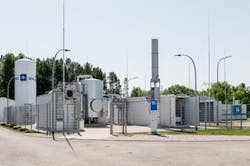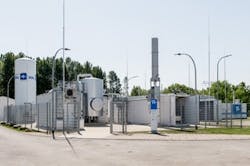“Green” Methane Pilot Plant Starts Up
In May, German utility Uniper, Düsseldorf, began operating an innovative 1-MW power-to-gas (PtG) pilot plant in Falkenhagen, Germany. The unit converts hydrogen from regenerative energy sources and carbon dioxide from a nearby bio-ethanol plant into methane, i.e., synthetic natural gas (SNG), at normal temperature and pressure. The transformation itself occurs in a prototype honeycomb catalytic reactor developed by the Karlsruhe Institute of Technology. Karlsruhe, Germany.
Figure 1. Falkenhagenfacility uses hydrogen and carbon dioxide from regenerative sources to produce “green” methane. Source: Uniper.
Hydrogen for the process comes from Wind Gas Falkenhagen, a neighboring PtG plant built in 2013 to store wind energy within the German natural gas grid. That 2-MW facility produces up to 360 m3/hr of hydrogen via six alkaline electrolyzers.
The new methanation plant uses 210 m3/hr of hydrogen from Wind Gas in the reaction to produce up to 57 m³/hr of SNG; this output, roughly 600 kWh/hr, could heat a 50-m2(≈540-ft2) apartment for a month. The existing natural gas infrastructure can handle transport and storage of the SNG produced.
The reaction also generates a significant amount of heat, which a high-pressure hot water pipeline delivers to a neighboring veneer mill for use in its production processes. Meanwhile, water produced by the methanation process goes to the water supply of the electrolysis systems in the Wind Gas plant.
Falkenhagen is one of three PtG pilots currently under development in Europe as part of the European Union’s four-year STORE&GO project, which was launched in 2016under the E.U’s Horizon 2020 research and innovation program. Total project funding is expected to reach €28 million ($33 million), with €18 million ($15 million) coming directly from the E.U.
The pilot plant’s operation over the next 24 months primarily will focus on gaining insights about specific technical areas.
“The general methanation process will be investigated in detail by various test programs to gain information on efficiency, stability, flexibility and optimization potentials. The pilot plant performance and efficiency will be compared to the other two STORE&GO pilots installed in Switzerland and Italy, with the aim to find an optimum technology for any potential boundary conditions,” says Helge Föcker, project manager storage facilities and project management, Uniper Energy Storage.
Looking to the future, Föcker is confident the technology being tested is robust enough for the rigors of commercial operation. “We believe that our pilot plant investigations will show only limited scale-up challenges and that plants in the 10-MW+ class could be realized with a very similar concept,” he adds.

